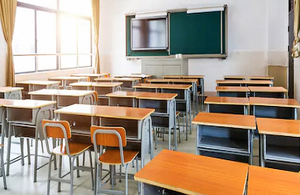'Give schools extra money to let pupils retake school year'
The Education Secretary should put extra funding in place to let pupils resit this school year, says the Social Mobility Commission.

In a statement, the commission outlined its concerns over contingency plans for pupils affected by the global COVID pandemic.
It said: ‘We, like teachers and parents across the country, share with the Education Secretary his concerns over young people missing out on education, and deeply regret that schools and colleges are now closed.
The loss of a normal exam season is also unfortunate.
‘But exams are only the test of knowledge – the bigger issue is the huge and growing learning loss during a year of massive disruption.
‘Allow pupils to retake a year’
‘We need to think far more carefully, moving beyond sticking plaster solutions, and consider options such as allowing some children to retake a year, funded with extra resources.
‘The lesson of the pandemic has been that delay is costly. This is as true in education as it is in healthcare. The plans put forward in the statement yesterday are adequate – but they are late, and they are incomplete. In future, we would hope that government and the teaching profession can come together, with mutual trust, to plan effectively and holistically for all eventualities, so that plan A can switch to plan B with the minimum of fuss.
‘It is unfortunate that the Education Secretary has not chosen to share with schools the contingency plans he states he has already made so they could move seamlessly to delivering the necessary teaching, remote or otherwise.
Risk of losing motivation
‘And it is a significant problem that these plans are still not at a stage where teachers can get on with engaging year 11, 12 and 13 students with a deliverable assessment process at the critical point when they are most at risk of losing all motivation.
‘All of this was foreseeable - in fact, we, like many others, called for a clear system of gathering centre assessed grades to be published at the beginning of the academic year- and it is not enough for the secretary of state to say the contingency plans are in operation when they so clearly are not ready yet.
‘When it comes to securing the futures of our most vulnerable children, we support the government’s efforts to ensure quality remote learning. But this needs to be backed up on the ground by speedy distribution of technical resources - both laptops and broadband access.
‘The initiative to make access to education sites free is welcome, as is the content being delivered by the BBC. The use of Ofsted to monitor remote learning, however, must be managed very carefully to avoid either the fact or the impression of being punitive - it has a role, but only to support and share best practices.
‘It is good that pupils without access to devices, functioning high speed broadband, or lack of learning space within the home are now considered vulnerable and are free to go back to school during lockdown. ‘Unfortunately, government has failed to communicate this effectively either to parents or schools and teachers. Efforts must be made quickly and loudly to rectify this.
Inequality gap widening by the day
‘The challenge now lies in two things – the speedy delivery of these promises, and the long-term support of the young people for whom this last year represents a catastrophic disruption in their lives. The inequalities in our schools are widening by the day – not just for those labelled as disadvantaged, but also for those who have huge struggles, both socially and economically, even if they don’t fall into limited and blunt categories like free school meals.
‘Vital steps must be taken now:
• The system for teacher assessment must be communicated to schools as a matter of absolute urgency. • Those whose learning loss is too significant to make up must be offered the possibility of resit years - and schools and colleges must be funded properly to provide this. • And Government must convene a new body to plan educational recovery and reassessment over the next five years.
‘We cannot look away from the disaster that will unfold if we yet again do not learn our lesson, and yet again fail to plan for the long term. ‘